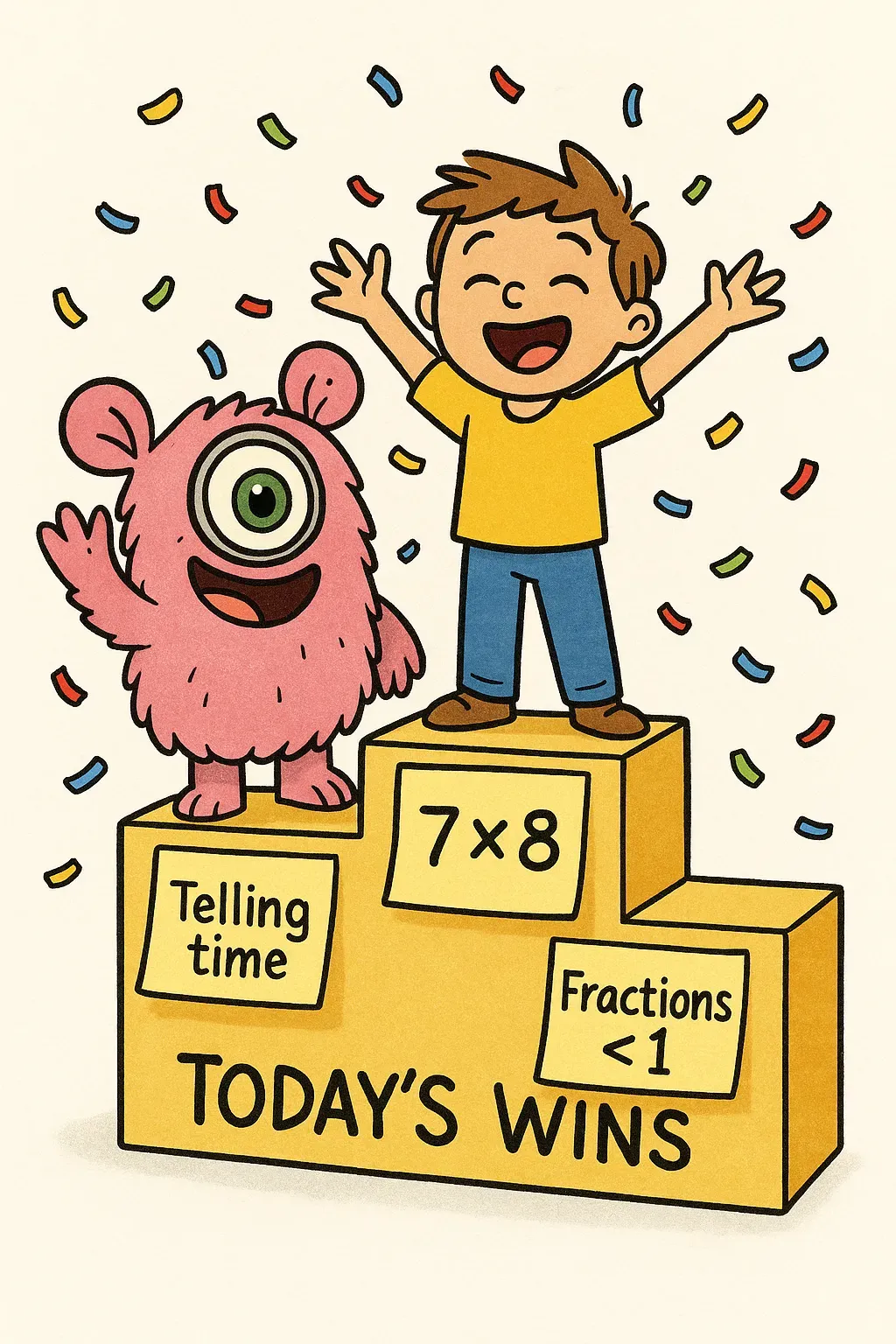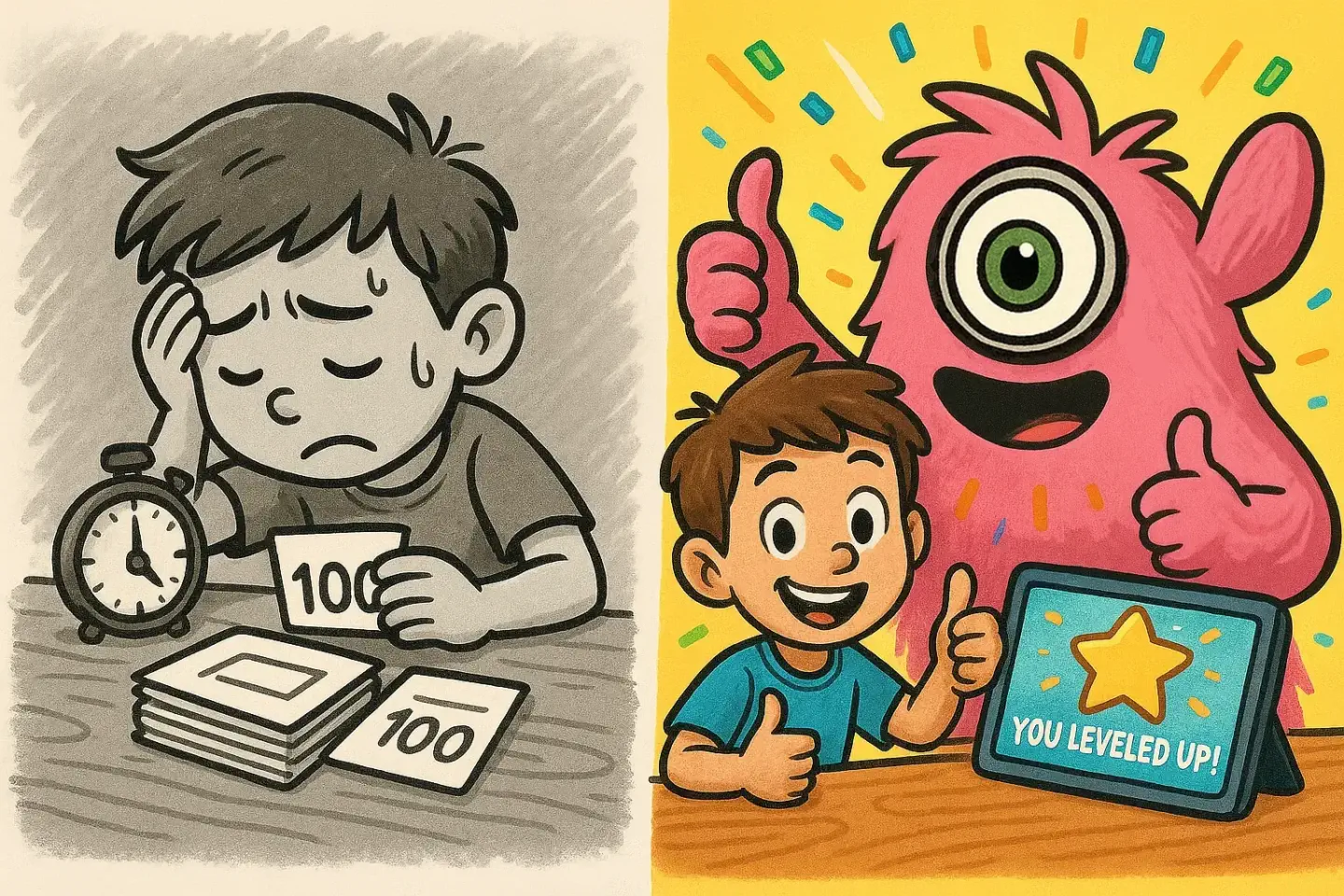Why Your Child Needs Math Wins (And Not Drills)
As parents, it’s natural to think that the more math problems your child drills through, the better they’ll get. However, experts now suggest that racking up “math wins” – those small successes and moments of understanding – can be far more powerful than endless worksheets. By focusing on achievable challenges and celebrating improvements, you can build your child’s confidence and love for math, rather than turning math into a chore.
What Are “Math Wins” and Why Do They Matter?

“Math wins” are those positive moments when a child achieves a goal or solves a problem in math – essentially, any success that gives them a sense of accomplishment. It could be correctly answering a tough homework question, finally mastering the times tables, or even discovering a clever way to do a calculation. These wins may seem small, but they pack a big punch in how a child feels about math. Each success is like a building block for confidence.
Psychologists have long found that success can feed a child’s motivation. In fact, a large longitudinal study showed that when children achieved more in math at early grades, their intrinsic motivation for math increased in later years. In other words, math achievement tends to be self-reinforcing: doing well makes kids want to learn more. This creates a positive cycle – a child who feels “I can do this!” is more likely to tackle new challenges and stick with math when it gets harder. Small wins accumulated over time help children develop a growth mindset and the confidence that they can improve with effort.
Importantly, creating math wins doesn’t mean making everything “easy.” It means scaffolding the learning so that your child is appropriately challenged but not overwhelmed. For example, instead of handing a 2nd grader 100 random subtraction problems to drill, you might give them a set of ten problems that gradually increase in difficulty, with support or hints as needed. By the end, they’ve solved something that initially looked hard – and that victory is motivating. In one experiment, researchers used an adaptive program to ensure kids experienced high success rates in math practice; children who were set up to get more answers right attempted more problems and showed greater improvement in math performance than those who practiced with no adjustment for success rate. The higher the “win rate,” the more the students practiced voluntarily and the more they learned. The takeaway: success breeds confidence, which in turn breeds more practice and learning.
Drills, Rote Memorization, and the Downside of “Drill-and-Kill”
Traditional math drills – think flash cards, timed tests, and endless worksheets of similar problems – have a purpose: they aim to hammer math facts into memory through repetition. Practice is indeed an essential part of learning math. However, when practice turns into mind-numbing drill with no sense of progress, it can backfire. An overemphasis on speed and rote recall can make math a negative experience, especially for young learners.
One major concern is math anxiety. When children are put under pressure to perform calculations quickly or perfectly every time, it can trigger stress and fear of failure. Over time, they may start to panic at the sight of a math problem. As Stanford professor Jo Boaler noted, there is strong evidence that timed math tests can induce anxiety even in otherwise high-achieving students. Neuroscience research suggests that forcing kids to race through drills causes the early onset of math anxiety in many children. Once math anxiety sets in, it becomes a barrier that can haunt students for years, discouraging them from pursuing math-related courses or careers.
Beyond anxiety, drill-heavy approaches can sap the joy and curiosity from math. Children’s brains crave engagement and meaning. If math is presented as just a series of abstract fact regurgitations, many kids (and especially those with attention difficulties or learning differences) will tune out. For example, parents of children with ADHD often find that rote drills and worksheets quickly lead to frustration and lost interest – the child’s attention wanders because the task is too monotonous, and their learning effectiveness drops. Even for neurotypical kids, doing the same type of problem over and over without understanding why can prevent deeper learning. They might memorize 7 × 8 = 56 today, but without any context or conceptual grasp, that fact may not stick (or might be easily confused with 8 × 7 or 6 × 7 later on).
There’s also a biological reason excessive stress and repetition can fail: stress hormones like cortisol actually interfere with the brain’s memory systems. When a child is anxious – say, sweating over a timed drill – their body releases cortisol, which in high levels can impair the hippocampus’s ability to form and retain memories. In practical terms, that means the very pressure we put on kids to memorize math facts quickly might be hampering their ability to remember those facts! A child who is tense and fearful during math practice is less likely to internalize the content. This is why many educators now advocate for “low-stakes” practice – creating an environment where mistakes are okay and the goal is improvement, not perfection.
None of this is to say that practice isn’t important – it absolutely is. Children do need to practice math skills to become fluent. The key difference is how they practice. Simply drilling harder or longer is not the answer. Short, strategy-based practice sessions can actually yield better retention than long drilling sessions, because strategies engage the child’s thinking and reduce stress. For instance, practicing six math facts using visual or story-based strategies can be more effective than cranking through a dozen speed drills in a state of panic. The goal should be to practice smart, not just hard.
How to Switch from Drills to “Math Wins”
If pure drilling isn’t the optimal path, what is? The good news is there are many research-backed techniques to help children learn math facts and skills while keeping them motivated:
- Game-Based Learning: Math games transform practice into play. Whether it’s a digital app or a simple homemade game, introducing points, levels, and challenges can make practice fun. Studies have found that game-based learning environments significantly boost students’ math achievement and self-confidence. In one study, an interactive math game helped elementary students improve not only their calculation skills but also their self-efficacy and motivation, compared to a group that learned via traditional drills. Games provide instant feedback and reward progress, which means kids experience frequent “wins” as they advance through levels or earn points.
Read more: 5 Amazing Math games for your ADHD child - Adaptive Challenges: Use tools or techniques that adjust to your child’s ability. Adaptive learning apps (like Monster Math’s game-based system, for example) continually gauge what a child knows and where they struggle, then serve up problems that are challenging yet solvable. This ensures the child isn’t bored by things that are too easy or discouraged by things that are too hard. The result is a steady stream of achievable mini-challenges – plenty of math wins to keep morale high.
- Strategy Over Speed: Encourage your child to discover and use clever strategies for math facts instead of brute-force memorization. For instance, for the fact 7 × 8, a strategy might be: “I know 7 × 7 = 49, and one more 7 makes 56.” When children use strategies, they’re actively thinking about numbers and relationships, which helps them understand and remember better. It also gives them a sense of accomplishment (“I figured it out!”) rather than just relying on rote memory. Research supports this approach – understanding the reasoning behind math operations builds a stronger foundation, which eventually leads to both fluency and confidence.
- Celebrate Improvements: Make a habit of recognizing effort and progress, not just perfect scores. If yesterday your child could only do 2 multiplication problems in a row correctly, and today they did 5, that’s a win. Perhaps they initially got 40% on a fractions quiz, and next time they got 60% – that improvement is worth celebrating. By highlighting these gains, you reinforce the idea that practice leads to progress. Over time, your child will start seeking out those improvements themselves. This positive reinforcement is much more motivating than focusing on what they got wrong. It aligns with the idea of “mastery-oriented” learning – valuing growth and learning over raw performance.
- Make It Multisensory: Especially for younger children, incorporate physical activity or visual aids into math practice. Counting hops, using manipulatives (like blocks or beads), or drawing out math problems can turn learning into an engaging experience rather than a static drill. This not only helps understanding but also breaks the monotony of paper-and-pencil tasks. When kids are actively engaged, they’re more likely to have those “Aha!” moments that constitute math wins. And with each hands-on success, their confidence grows.

By shifting from a drill-centric approach to one focused on creating positive learning experiences, we address both the cognitive and emotional sides of math education. A systematic review of educational studies concluded that game-based learning in math not only improves knowledge and skills but also boosts student attitudes and engagement. In simpler terms, when math feels like a game or an adventure, kids learn more and actually enjoy the process. They become active learners rather than reluctant memorizers.
All of this is at the heart of why your child needs math wins, not drills. It’s about cultivating a love of learning and a resilient mindset. When a child builds a tower of successes – no matter how tiny each block is – they create a platform to reach higher skills. In contrast, a trail of drill-induced failures can cause that tower to crumble, leaving a child thinking “I’m just not good at math.” By emphasizing wins, you’re showing your child that math is something they can conquer, step by step. Math stops being a scary monster and starts becoming an exciting puzzle.
In the long run, a child who enjoys math and believes in their own capabilities will outperform the child who only learned to fear drills. Confidence and curiosity are the engines of achievement. So celebrate those victories – each correct answer, each new concept understood, each personal best. Over time, you’ll notice not just better grades, but a child who approaches math with eagerness and perseverance. And that positive attitude is the real win, one that will carry them through all their academic adventures.
FAQs
What does “math wins, not drills” mean?
It’s a philosophy of focusing on helping your child gain positive successes in math (big or small) rather than forcing them through repetitive drills. A “math win” could be mastering a new concept or improving on a skill – anything that boosts their confidence. Instead of drill-and-kill exercises that might bore or frustrate them, you emphasize enjoyable learning experiences where they can succeed and feel good about math.Are math drills bad for my child?
Math drills aren’t inherently evil – a bit of practice and repetition is necessary in math. The problem is when drilling becomes excessive or stressful. If drills are timed or high-pressure, they can create anxiety and make your child dislike math. Used sparingly and playfully (for example, as a quick warm-up game), drills can reinforce skills. But they should never be the only tool. It’s important to balance practice with understanding, and to ensure your child isn’t just memorizing facts without context. If you do use drills, keep them short, low-stakes, and mix them with other engaging activities.How can I create “math wins” for my child?
Start by setting your child up for success. Choose activities at the right level – not too easy (or they’ll be bored), but not too hard (or they’ll feel discouraged). Use tools like adaptive math apps or leveled worksheets that progress gradually. Celebrate every improvement, no matter how small. You can also incorporate math into fun projects or games – for example, baking to practice measurements, or playing store to practice adding money. The key is to let your child experience the joy of figuring something out. When they exclaim “I got it!” – that’s a math win.Won’t avoiding drills leave gaps in my child’s knowledge?
Not if you replace mindless drills with meaningful practice. Children can achieve mastery through a variety of methods – solving puzzles, applying math in real-life situations, using visual aids, and yes, some repetitive practice when needed. The difference is, you’re making sure they understand what they’re doing and enjoy the process. This actually leads to better retention. If there’s a specific skill that does require memorization (like basic addition or multiplication facts), you can still help your child learn it through flashcards or recall – but do it in short bursts and make it a positive challenge rather than a punishment. For instance, you might practice with flashcards for five minutes a day and track progress, turning it into a personal game where they try to beat their own record (with plenty of encouragement).How does confidence in math affect performance?
Confidence is huge. When kids believe they can do math, they’re more likely to put in effort and persist through challenges. There’s research showing that confidence and achievement feed each other: doing well makes kids more confident, and that confidence leads them to do even better. On the flip side, if a child loses confidence (often due to repeated negative experiences like failing timed drills), they might develop math anxiety and start avoiding math. That creates a vicious cycle where they fall further behind. By building confidence through small wins, you’re creating a virtuous cycle instead – success leads to confidence, which leads to more success.
References
- Boaler, J. (2014). Research suggests timed tests cause math anxiety. NebraskaMATH Announcement. (Stanford University News)
- Jansen, B. R. J., Louwerse, J., et al. (2013). The influence of experiencing success in math on math anxiety, perceived math competence, and math performance. Learning and Individual Differences, 24, 190–197.
- Garon-Carrier, G., Boivin, M., et al. (2016). Intrinsic motivation and achievement in mathematics in elementary school: A longitudinal investigation of their association. Child Development, 87(1), 165–175. DOI: 10.1111/cdev.12458
- Hung, C.-M., Huang, I., & Hwang, G. (2014). Effects of digital game-based learning on students’ self-efficacy, motivation, anxiety, and achievements in mathematics. Journal of Computers in Education, 1(2–3), 151–166.
- Hui, H. B., & Mahmud, M. S. (2023). Influence of game-based learning in mathematics education on students’ cognitive and affective domains: A systematic review. Frontiers in Psychology, 14:1105806.
- Kim, E. J., Pellman, B., & Kim, J. J. (2015). Stress effects on the hippocampus: a critical review. Learning & Memory, 22(9), 411–416.


Comments
Your comment has been submitted